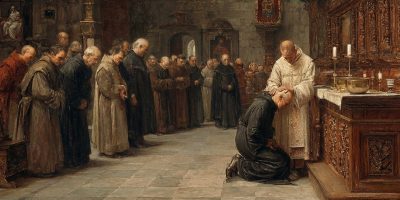Public Square Magazine: Thank you so much for taking the time to sit down with us. I’m excited about your new book, Even in the Darkest Hour: Lament as a Path to God. Tell me a bit about the project. What is it about?
David Huston: Very briefly, the book is about the spiritual practice of lament. Lament is faithfully taking our complaints to God. The book explores the reality that sadness, grief, and sorrow are part of our mortal journey and then asks the question: “How do you worship from within pain?”
There is a sense in Christian culture generally and Latter-day Saint culture specifically, I think, that one must overcome sadness, grief, and sorrow—or be coming out of them—before one can worship, or said another way, that the only language appropriate for worship is the language of praise and thanksgiving. However, our scriptures and sacred tradition point to lament as how we worship from within pain. It’s the language of worship used when we are unable or unwilling to use the language of praise. Make no mistake, lament is worship, but it sounds and feels different than the language of praise.
In a way that I believe is somewhat unique from other kinds of worship, lament is premised on complete openness with God. Lament trusts God with our most painful emotions in our moments of greatest vulnerability. Lament is at the center of a truly authentic covenant relationship with God. And as we learn to lament, we put ourselves in a position for a certain kind of newness and anticipated deliverance, a newness and anticipated deliverance built on the same faith from which lament springs.
PSM: How were you inspired to write it?
MDH: There are two events that led to this book. First, a few years ago, I attended Wesley Theological Seminary (something I wrote about on Public Square). As part of my coursework in the Old Testament, I was exposed to the lament psalms. I had always been vaguely aware that these existed, but I had never studied them seriously. When I finally did, I was overwhelmed with the spiritual intensity and rawness of the language. It was at Wesley that I first realized that lament was a form of worship … lament, I realized, was the way we worshiped when we were in the midst of pain. As someone who had grown up in a Latter-day Saint worship community dominated by the language of praise, this was a paradigm-shifting insight.
Second, as I was leading a discussion on D&C 121, I chose to focus on Joseph’s lament (verses 1-6) and used that as a launching pad to look at other examples of lament from the New Testament, the Book of Mormon, and the Old Testament (pulling on what I had learned from Wesley). The reaction of those in the class suggested to me that there was a real longing to add the language of lament into our spiritual toolboxes. It occurred to me that the broader Latter-day Saint community would benefit from a more fulsome exploration of this theme and a discussion of the power that lament can bring into our lives. So I decided to write a book about it.
PSM: What are the benefits of adding lament into our “spiritual toolboxes,” as you say?
MDH: Life can be hard; really hard sometimes. And because so many have been taught—often unintentionally—that the ‘right’ way to worship is through language of praise, when we are in our moments of deep sadness and sorrow, those times when we may not be able to summon language of praise, it may feel like worship isn’t possible. But this is a problem of our own making, because there IS a way to worship when we are hurting: lament. Lament gives us a language of worship that can be used from within pain. Lament is what faithfulness looks and sounds like when we are mourning. Lament is how we cling to our covenant relationship with God when the world is crumbling around us. Lament—and the trust and faith that it requires—is foundational to an honest, open, and authentic relationship with God. We’re all going to need to lament at some point, and so will all of our neighbors. It is in this way that lament is irreplaceable—it’s not just a “nice to have;” it’s a “need to have.”
PSM: You mention that lament requires trust and faith. How so? How does it differ from mere complaining?
MDH: Taking these in reverse order. I think the better question is: “How does lament differ from murmuring?” Murmuring is a complaint about God, whereas lament is a fully open expression to God from the midst of sadness and grief. Murmuring does not seek or expect a response from God, but lament is foundationally premised on the trust that God will respond and on a conviction of God’s loving-kindness, concern, and ability to act on our behalf.
Perhaps, to the uninitiated, lament sounds like complaining, but to those who understand and/or who are utilizing lament as a form of worship, they recognize that lament is the act of taking pain and woundedness and laying it, unashamedly and courageously, on the Divine altar. This is why faith and trust are foundational to lament. It’s easy for us to believe God is listening when we’re talking about how great and wonderful God is and thanking God for all the good things we have. But I think it requires a different level of faith and trust to say directly to God:
“… my soul is full of troubles: and my life draweth nigh unto the grave.
I am counted with them that go down into the pit: I am as a man that hath no strength …
Thou hast laid me in the lowest pit, in darkness, in the deeps.
Thy wrath lieth hard upon me, and thou hast afflicted me with all thy waves ….
Thou hast put away mine acquaintance far from me;
thou hast made me an abomination unto them: I am shut up, and I cannot come forth …
Lord, why castest thou off my soul? why hidest thou thy face from me?
The person who can speak those words is one whose faith is so deep and whose trust is so complete that she is unafraid to take even the most difficult feelings directly to God (after all, God knows that we feel this way; the only question is whether we trust God enough to express it). This is the kind of openness and authenticity that lament requires. Without lament we are always holding something back; we are never being truly honest with God. And I believe this kind of trust and faith is what undergirds a true covenant relationship.
PSM: Why is lament sometimes missing in the lives of Latter-day Saints?
MDH: There are likely at least a couple, but overlapping, explanations. First, for reasons that are obvious, there is a lot to be happy about when it comes to Jesus’s Gospel. In our worship—both in formal services and in informal gatherings—we tend to focus, almost exclusively, on those positive things and through the lens of praise. The talks, instruction, and testimony are nearly all praise-centered. The result, second, is that we are never really taught or shown what worship through lament looks and feels like. It’s a worship practice to which we are simply not exposed very often, if at all. But, to be clear, this phenomenon is common, I think, across Christianity. Collectively, Christians are good at praise and not nearly as practiced at lament.
That said, this doesn’t mean that lament never happens. I believe it does; certainly, folks use lament (probably some do it intentionally, and others do it intuitively). But lament, as a worship practice, really isn’t visible in our worship services and religious instruction. So, one big goal of this book is to start a conversation about how and where lament can be intentionally introduced more often.

PSM: What obstacles do we face in learning to approach God in this way?
MDH: Again, there are at least a couple and they, again, overlap. First, most of us have not been taught what lament is, how it works, and when it can be useful. Though it’s not impossible to lament without being taught to do it (e.g., one can pray without explicit instruction as to how), without instruction on lament, many of us just don’t know it is an option. And relatedly, second, because we may not know that there really is a way to worship from within pain, we often feel “guilty” when we express sentiments that don’t feel like praise—or, even more damaging, we are “corrected” when non-praise-focused sentiments are expressed. Consider this example:
What if someone were to get up in a testimony meeting and say this (these are the first four verses of Psalm 13):
How long wilt thou forget me, O Lord? for ever? how long wilt thou hide thy face from me?
How long shall I take counsel in my soul, having sorrow in my heart daily? how long shall mine enemy be exalted over me?
Consider and hear me, O Lord my God: lighten mine eyes, lest I sleep the sleep of death;
Lest mine enemy say, I have prevailed against him; and those that trouble me rejoice when I am moved.
My sense is that there would be a lot of uncomfortable people shifting in their seats. Not only is the speaker accusing God of forgetting him, but he is also challenging God to start acting like God. This is provocative language. And unless you can see and hear it, you may not recognize this as lament and as a deeply powerful and specific form of worship.
So, either the person who expresses this may feel guilty that he said it in the first place and apologize (as if this expression was bad in some way), and/or someone else might get up and say, “Well, I know that God is always good and looking out for us …” thereby “correcting” him by reinforcing the preeminence of praise language, thus, implicitly suggesting that such language needs correcting and that praise is the only proper form of worship.
Because we don’t understand lament as well as we might, we are not as comfortable with it as we probably should be. The result is that lament is an underexplored and underutilized spiritual practice.
PSM: Are there any spiritual dangers to lament?
MDH: Remember, lament is just a specific kind of worship. Just like praise and thanksgiving. We find examples of all of these types of worship (and others) in the Psalter, for instance. So, the question should probably be extended. Are there any spiritual dangers to lament? Are there any spiritual dangers to praise? Are there any spiritual dangers to thanksgiving? I think the short answer is that if lament stays lament, and praise stays praise, and thanksgiving stays thanksgiving, then no, there are no spiritual dangers. In fact, lament is critical since it gives a language of worship when praise and thanksgiving are not forthcoming.
That said, if one leaves lament and strays into murmuring, or if one leaves praise and strays into idolatry, or if one leaves thanksgiving and strays into pride, or if one replaces any worship practice with a counterfeit, then that is a problem. Consider the Zoramites and the Rameumptom; praise and thanksgiving were replaced with forms of idolatry and pride. In fact, the Book of Mormon and the Bible contain many examples of the blessed faithful straying out of praise and thanksgiving and into idolatry and pride. Yet, we moderns still tend to view lament with suspicion. I find that curious. And I’m hoping to start a conversation that will work toward changing that.
PSM: What were some of the most interesting lessons you learned in researching and writing your book?
MDH: It was during the drafting of the manuscript that I really came to appreciate that lament is a critical component of an authentic relationship with God. Real relationships, the kinds of relationships that can be transformative, require complete openness. If we never learn to lament, we never learn to be completely open with God. A covenant relationship with God requires that we develop the ability to approach God honestly in all the phases of our lives. Relatedly, I realized that the transformational process begins, in a way that I’m not sure I completely understand, with lament. There is something about the ability to lament—and the faith and trust that it requires and upon which it is built—that opens us up to the possibility of newness. Finally, I believe more strongly in the power of communal lament. Lament is important as a personal worship practice, but we must embrace it as a community and practice it within our community. Communal lament is one way that we mourn with those who mourn, and thus, communal lament is part of what it looks like to be a Christian. Lament, like all parts of Jesus’s Gospel, is both an individual and community activity.
PSM: If your readers take one thing away from your book, what do you hope it will be?
MDH: Because lament is connected to the most difficult times in our lives, each person’s (and each community’s) use of lament will be different and deeply personal and unique. When the time for lament arrives (and it will, for each of us), my hope is that readers will feel empowered to figure out how lament works in their own lives and communities and then make use of this transformative spiritual practice for themselves.
PSM: Is there anything else you want to add?
MDH: I think it’s important to remember that lament is not a new-fangled, new-age approach to spirituality. Lament has existed since ancient times. Lament is part of our sacred tradition. Yet, even though its roots are ancient it is powerfully applicable in our modern times and, at certain points in our lives, may be the primary way we cling to our covenant relationship with God. I’m hopeful that we can rediscover and more fully integrate lament in our personal and community worship.
PSM: Thank you so much for your time and for helping us explore such an interesting subject. Those interested in Even in the Darkest Hour, Lament as a Path to God can find it at Deseret Book.

















